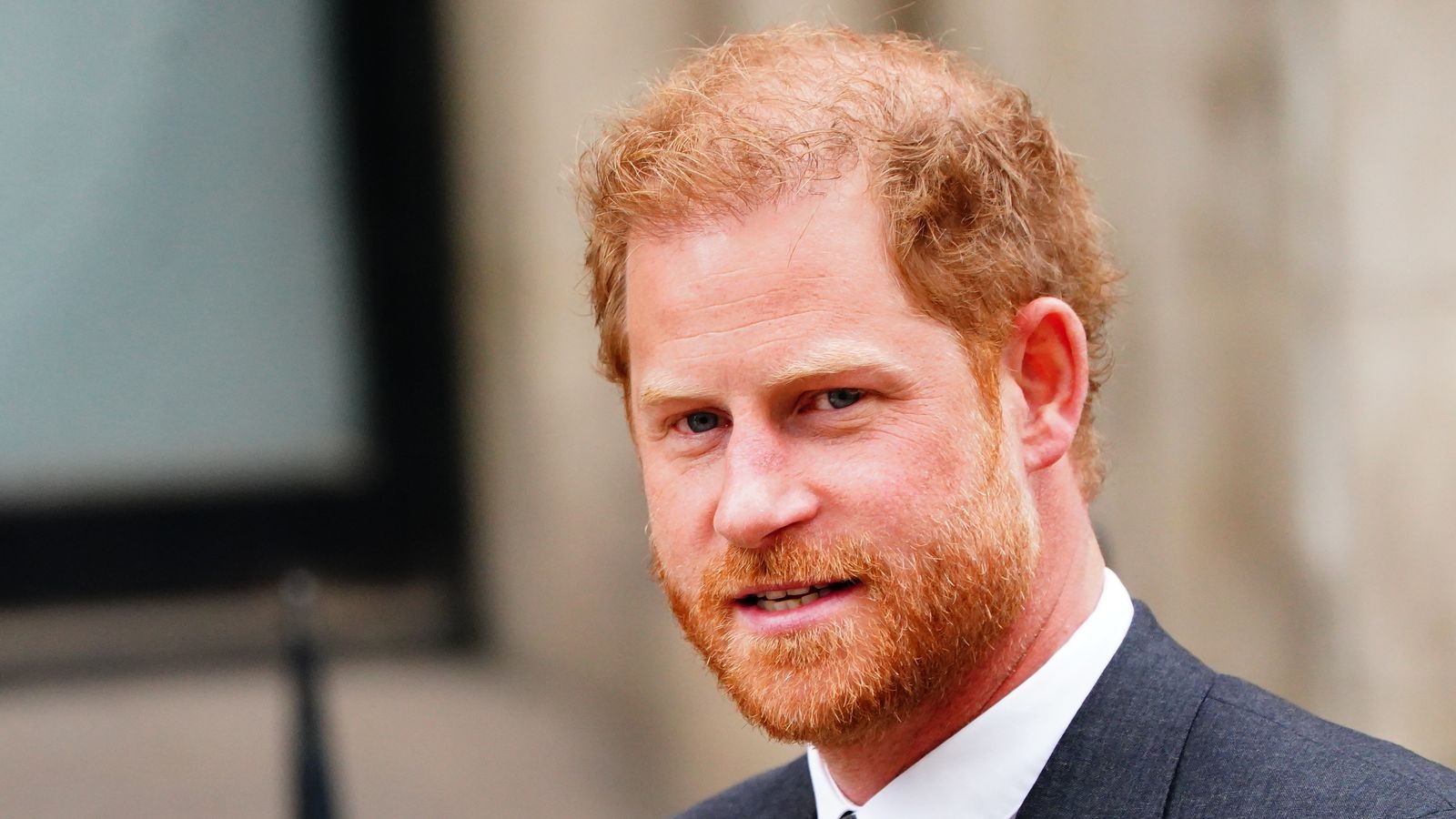Prince Harry 'unjustifiably treated less favourably than others' over protection in UK, court told
Harry is taking legal action against Britain's Home Office over a decision in February 2020 that meant he would no longer be given the "same degree" of personal protective security when visiting.

Prince Harry "has, unjustifiably, been treated less favourably than others" over his security arrangements when he is in the UK, a court has been told.
The Duke of Sussex is taking legal action against the Home Office over a decision in February 2020 that meant he would no longer be given the "same degree" of personal protective security when visiting.
The decision was made by the Executive Committee for the Protection of Royalty and Public Figures (Ravec).
Shaheed Fatima KC, representing the duke, said in a written submission: "Ravec should have considered the 'impact' that a successful attack on the claimant would have, bearing in mind his status, background and profile within the Royal Family - which he was born into and which he will have for the rest of his life - and his ongoing charity work and service to the public.
"Ravec should have considered, in particular, the impact on the UK's reputation of a successful attack on the claimant."
She said Harry's position is "that he should be given state security in light of the threats/risks he faces," arguing he has "unjustifiably, been treated less favourably than others" in written submissions, which have been heavily redacted.
Harry is not attending the hearing at the High Court, where much of the case will be heard in private over the next three days, with a decision expected at a later date.
Opening the case, his barrister said: "The starting point in this case is about the right to security and safety of a person - there cannot be a right of greater importance."
She said the duke "has engaged fully and properly with the evidence" and that his "unlawful and unfair treatment" was apparent from the documents.
Harry is asking the court to be treated in the way Ravec "has treated other people", she said, arguing that Ravec had chosen "not to follow its own written policy".
She said no Risk Management Board ("RMB") risk analysis had been carried out, adding: "This is the first time Ravec has ever decided to deviate from its policy in this way."
Ms Fatima said: "No good reason has been provided for singling the claimant out in this way".
She said Ravec had failed to tell Harry, who now lives in California with wife Meghan and their children Archie and Lilibet, he was not being treated "consistently and equally" with others nor why, and argued he was entitled to make representations before the decision was made.
Harry's position has 'materially changed'
Sir James Eadie KC, for the Home Office, said in written submissions that Harry has been treated in a lawful "bespoke" manner over his security arrangements.
He said in making the decision Ravec - which provides security arrangements for royals and others with the involvement of the Metropolitan Police, the Cabinet Office and the royal household - considers "the risk of a successful attack on that individual".
"In summary, Ravec considers the threat that an individual faces, which is assessed by reference to the capability and intent of hostile actors, the vulnerability of that individual to such an attack, and the impact that such an attack would have on the interests of the state," he said.
"As a result of the fact that he would no longer be a working member of the royal family, and would be living abroad for the majority of the time, his position had materially changed.
"In those circumstances, protective security would not be provided on the same basis as before. However, he would, in particular and specific circumstances, be provided protective security when in Great Britain."
But Ms Fatima argued that "case-by-case" security provision leads to "excessive uncertainty".
Diana's 'tragic death'
Sir James said the "tragic death" of Princess Diana was raised during the decision-making process, adding there would be "likely significant public upset were a successful attack on the claimant to take place".
"The decision, and its subsequent application, constituted a lawful balancing of relevant factors, in the conduct of a consideration of risk, impact and threat," he added.
He said Ravec's decision meant Harry could continue to be provided with security at the public expense "to the extent considered appropriate in certain circumstances", such as during his visit to the UK in June and July 2021 for the memorial events of his late mother.
However, in written submissions, the duke's lawyers said that during the trip his car was "interdicted by paparazzi" at a WellChild garden party and afternoon tea in Kew Gardens, west London, on 30 June after which a member of his private security team "reported issues" with his "security provision".
Sir James said details had not been provided until 11 June, which was "materially later" than the 28 days required by Ravec for requests for protective security on a case-by-case basis.
The hearing is one of the five High Court claims the duke is involved in, including extensive litigation against newspaper publishers.
Earlier this year, he was refused permission to bring a further legal challenge against the Home Office over a Ravec decision that he should not be allowed to pay privately for protective security.


